My week-long headache turned out to be a brain tumor – I had one unusual sign
Kimberley Baggley, from Stoke-on-Trent in Staffordshire, initially thought little of a migraine that sent her home from work.
Little did she know, this was the first sign that she had a potentially fatal brain tumor.
The 27-year-old only started to worry and developed ‘pins and needles’ to the left side of her face later that day, and rushed to A&E. However, she claims she was sent away with painkillers.
On four additional visits over the course of the week when she complained of the same feeling, she was also dismissed, she said.
Then things took a dramatic turn when her husband came home after taking their son swimming to find the elementary school teacher unconscious in bed after having a seizure.
Kimberley Baggley, from Stoke-on-Trent in Staffordshire, initially thought little of a migraine that sent her home from work
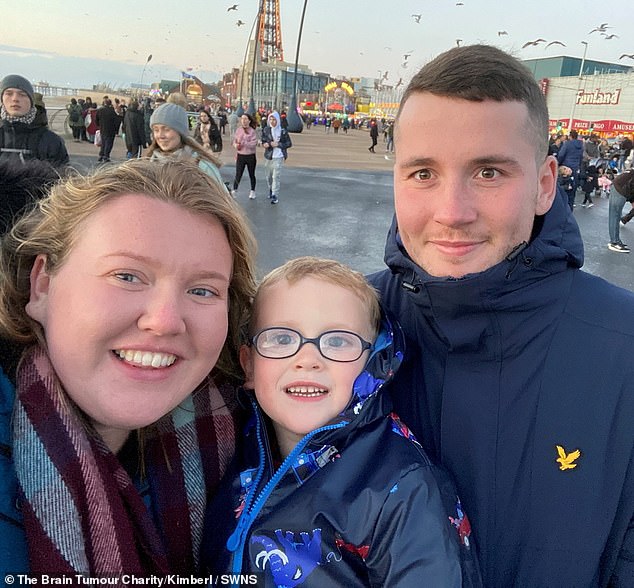
But when the 27-year-old started experiencing “pins and needles” in the left side of her face later that day, she rushed to the emergency room, where she says she was sent away with painkillers. Pictured is Kimberley with her husband, Luke Baggley, 28, and son George
Back in hospital, scans revealed she had astrocytoma – an aggressive brain tumor that affects around 4,500 Britons every year.
Despite surgery and 33 radiotherapy treatments, she is currently still undergoing chemotherapy to tackle the third-degree tumor.
Recalling her terrifying ordeal, Mrs Baggley said: ‘You never think something like this will happen to you, but when it does your whole world revolves around something you know nothing about – it’s terrifying.
‘Your life stops when you are diagnosed with a brain tumor.
‘There are so many unknowns ahead of you, and a long process that puts other parts of your life on hold.
‘At that moment your whole world collapses.
“My husband was terrified because he didn’t know what was going to happen.”
Astrocytomas are one of the most common types of brain tumors, accounting for around a third of all cases of this cancer in Britain.
They grow from specific cells called astrocytes, which protect nerves and are vital for processing information.
Experts still don’t know what exactly causes astrocytoma to develop, although scientists suspect there may be a genetic link.
Common symptoms include headaches, difficulty speaking, vision changes such as double vision or blurriness, as well as seizures, confused thoughts and memory problems.
Astrocytomas are classified from one to four depending on their severity and how they respond to treatment, with three and four considered high grade.
According to The Brain Tumor Charity, only around a quarter of Britons diagnosed with high-grade astrocytoma live for five years or more.
After suffering a seizure at home, Mrs Baggley suffered another while being blue lighted to Royal Stoke University Hospital.
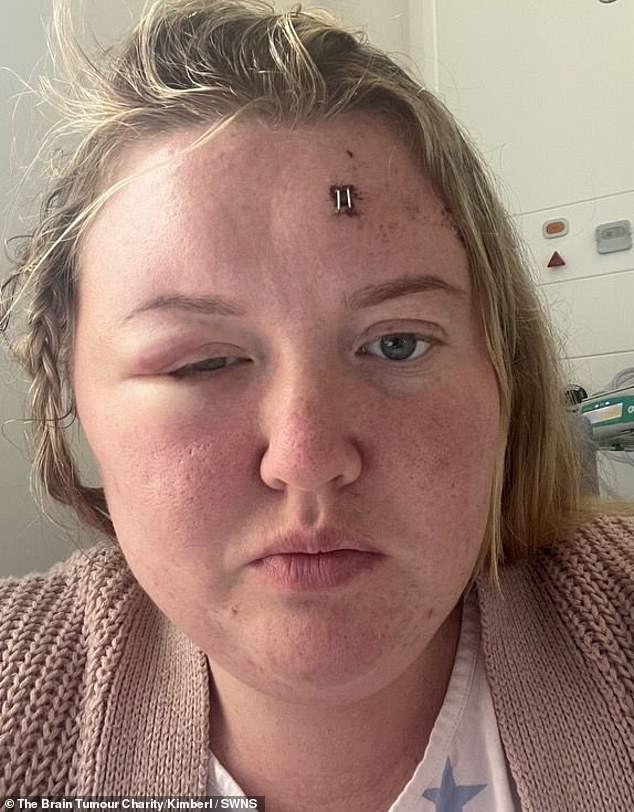
Despite surgery and 33 radiotherapy treatments, she is currently still undergoing chemotherapy to tackle the third-degree tumor
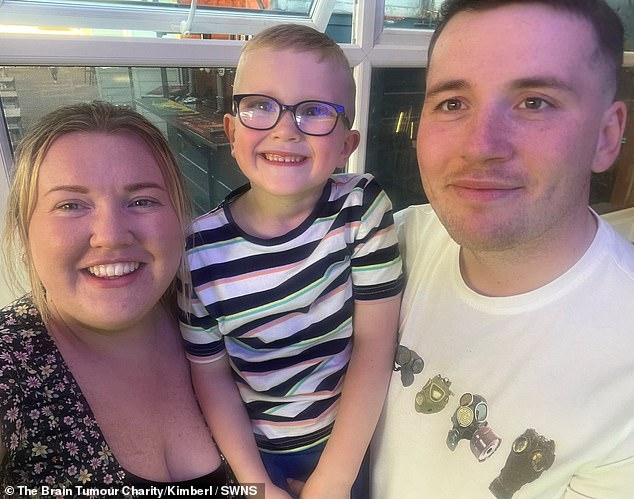
After suffering a seizure at home, Mrs Baggley suffered another while being blue lighted to Royal Stoke University Hospital
Medics then underwent surgery and removed 95 percent of the tumor, which was sent for analysis to determine what type of cancer it was.
Mrs Baggley said: ‘I remember my consultant saying it wasn’t the worst, but it wasn’t the best tumor to get either, and that put my mind at ease.
‘I was quite naive when I was first diagnosed as I am such a positive person and always try to make the best of a situation.
“I thought I was going to have the surgery and that would be it.”
However, a month after her first surgery, an infection meant she had to undergo another operation to remove part of her skull.
Since then, she has also battled sepsis, which delayed the start of her cancer treatment.
“The person my diagnosis has impacted the most is my husband,” Mrs Baggley said.
“He had to continue working while trying to care for me and our son.
‘He has taken on two roles and has been mum and dad for the past year.
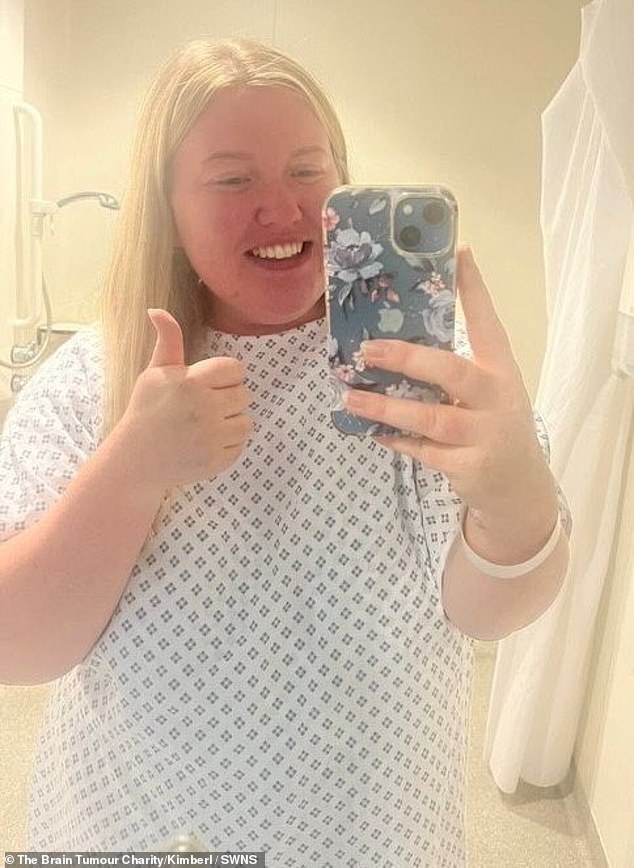
However, a month after her first surgery, an infection meant she had to undergo another surgery to remove part of her skull
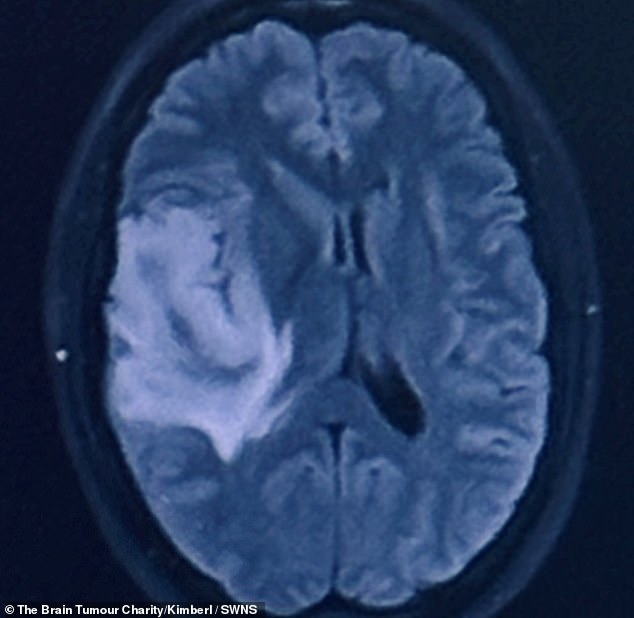
Since then, she has also struggled with sepsis, which delayed the start of treatment. In the photo Mrs Baggley’s brain scan showing the tumor (light blue)
‘My little boy found it difficult at first, one day he came out and said ‘mommy, are you dying?’ which was hard to hear.
“It has affected them and my whole family, to see someone you love go through something so terrible must be terrifying for them too.”
She added: ‘It’s time for things to change, for me and everyone else living with a brain tumour. That is why research into more effective treatments is so urgently needed.’
Since her diagnosis, Mrs Baggley has abseiled to Anfield Stadium to raise £7,000 for The Brain Tumor Charity and started a support group in Stoke-on-Trent to help other people diagnosed with cancer.
Dr. Simon Newman, chief scientific officer of The Brain Tumor Charity, which helps fund research into potential treatments, said: ‘High-grade brain tumors are among the most devastating brain tumors and current treatments are simply not good enough.
‘We hope that by understanding the immune system and how it responds to brain tumors, we can improve treatment options for immunotherapy and make the same progress in brain tumors that we have seen in other cancers.’
